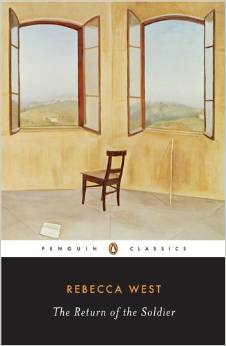I have to be honest. This is not at all the book I was planning to write about during this week when we are acknowledging the 100th anniversary of the start of WWI. I actually wanted to write about the wonderful My Dear I Wanted to Tell You by Louisa Young—which I highly recommend—but when I discovered this little book, I fell in love.
I did not even know it existed until I started to compile titles for our WWI reading list, but once I read the description I immediately had to read it, which, of course, makes a great case for lists.
The Return of the Soldier, published in 1918 but written during the war, is the story of Christopher Baldry, who, suffering from memory loss due to shell shock, is returned to his family estate to convalesce. Upon arriving home, he is reunited with his veddy upper class and terribly determined wife, Kitty, who he does not remember at all, and his beloved cousin, Jenny. It is Jenny who tells the story. The other character making up this quartet is the beautifully drawn and pivotal Mrs. Margaret Grey, an old acquaintance of Christopher’s and the only person he truly remembers. In fact, it is his inability to remember anything but his happy times with and abiding love for her that begins the story.
It is a very slim book, written very much in the style of the time, but West packs so much into each sentence and into each moment that I have not been able to get this book out of my mind, and already I want to read it again.
The story is classic: a soldier rendered amnesic from war wounds remembers only a time before any care and woe. This must have reflected a profound urge on the part of society at the time, having just watched in horror as a generation was dashed on the fields of France and Belgium. But it is given a beautiful twist because it is written by a woman, and focuses on the stories of women. These are three woman who are completely bound by the men in their lives. They are only able to behave and perform their roles as an extension of their family connections. None of them is free to make choices of any consequence on her own and so the struggle over what happens to Captain Baldry becomes a battle of desperate wills, with each woman bound to lose and gain significantly, depending on the outcome.
It is also a story of class, of the rigid structure of English society—about to be torn apart by the impact of war and the politics of the time—but still cleaving dillusionally to the traditions of social hierarchy and Empire. No one embodies this rigidity more than Christopher’s wife, Kitty. She is withering in her response to the working-class Margaret, as is Jenny in the beginning, both unable to believe that the worn woman who has come to deliver news of Christopher could ever have known or been anything to him. As the story unfolds it is clear that the past belongs to the frigid, class-bound Kitty, who is willing to sacrifice everything in order to maintain her position and it is Margaret, in all her soft, warm humanity, her ability to pivot and change—whether she wants to or not—who represents the future.
Margaret’s love and compassion are the qualities that could save Chris, but it is Kitty’s cold determination that nothing has changed or should change that condemns him. In this short novel, West tells a heartbreaking story of lost love, the horrors of war, and the profound cost of duty while she also skewers the twisted sense of class that deems one person better than another by dint of birth but is proven inferior by behavior.
This is a small book, and I cannot tell you too much of the plot because you will want to read it and discover it on your own, but I will say that once I read this I have not been able to forget it. Christopher, Kitty, Jenny, and Margaret have been with me constantly and I only wish I could reach through the pages and change their story. Stop them all before it is too late.





